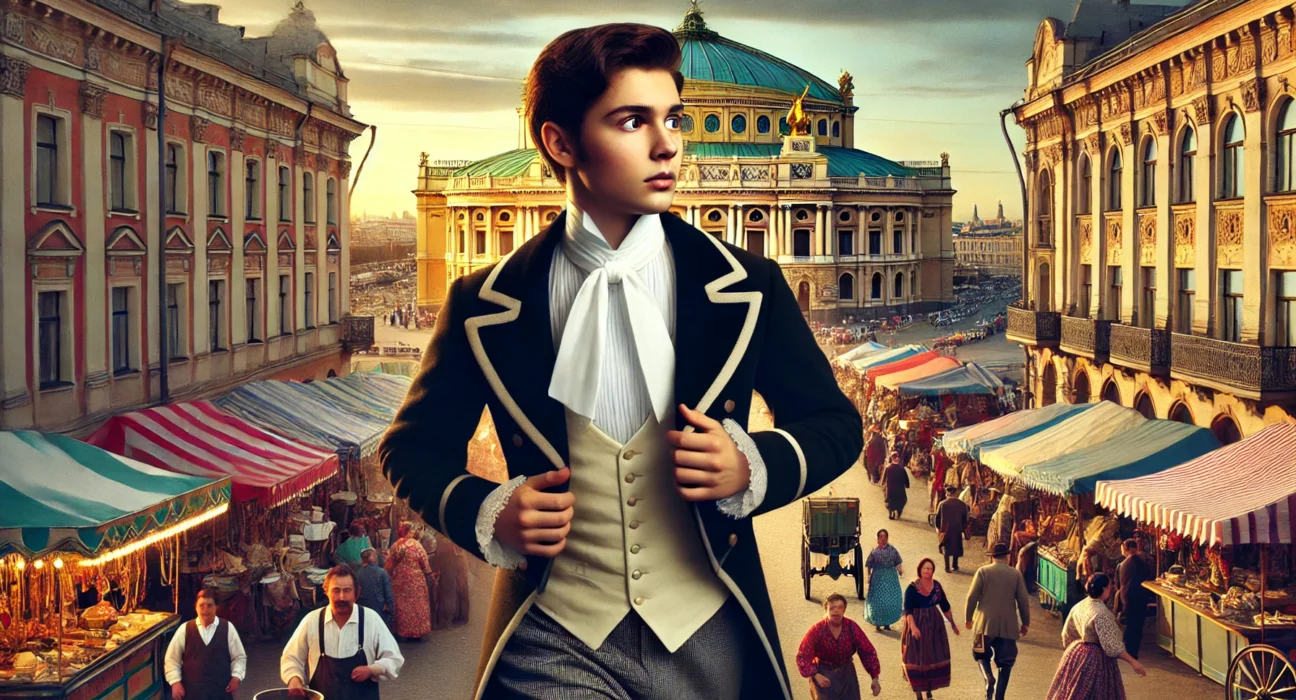Long Live the King! by Mary Roberts Rinehart, published in 1917, is a captivating story set in a fictional European kingdom. The novel combines elements of mystery, romance, and historical fiction, presenting a rich tapestry of court intrigue and the innocence of childhood juxtaposed with the heavy burden of royal duties. The protagonist, Crown Prince Ferdinand William Otto, a young and curious heir to the throne, navigates a world fraught with political tension and personal challenges.
Plot Summary
Prince Ferdinand William Otto, young and restless, sat in the royal box at the opera, his legs swinging in boredom. He had been promised a thrilling performance of “The Flying Dutchman,” but the ghostly ship did not fly as he had imagined. His aunt, the Archduchess Annunciata, sat beside him, enraptured by the music, while his English governess, Miss Braithwaite, watched him like a hawk. Across the way, his cousin Hedwig gave him a sly wink, their private rebellion against the stifling royal decorum. Otto longed for adventure, for the world beyond the velvet curtains and gilded balconies.
In a moment of daring, Otto slipped out of the royal box, careful not to attract attention. The corridor outside was empty, and the guard at the top of the private staircase was distracted, peering into the theater through a half-open door. With his heart pounding in his chest, Otto sneaked past and down the grand marble staircase, out into the bustling street. The city’s noises, the smells of food from street vendors, and the sight of ordinary people going about their lives intoxicated him. For the first time, he was just another boy in the crowd, not the Crown Prince, not the heir to a troubled throne.
Otto wandered through the market, his eyes wide with wonder. He watched a puppet show, lingered at a toy stall, and bought a fig lady from a vendor, savoring the forbidden treat. In a narrow alley, he stumbled upon a boy about his age, fiddling with a small toy airplane. The boy introduced himself as Bobby Thorpe, an American whose father managed the amusement park in the city. Bobby was everything Otto longed to be—free-spirited, adventurous, and unburdened by the weight of a crown. When Bobby invited Otto to join him at the amusement park, the prince hesitated only for a moment before agreeing.
The amusement park was unlike anything Otto had ever seen. It was loud, colorful, and full of life. Bobby led him to the Scenic Railway, a thrilling ride that promised the sensation of flying. Otto’s heart raced as they climbed into the car. As the ride began, they were pulled up a steep incline, the city spreading out below them. At the peak, for a breathless moment, Otto felt like he was on top of the world. Then they plunged into the abyss, the wind roaring in his ears, the car twisting and turning, sending him into fits of laughter. It was freedom, exhilarating and pure.
Unbeknownst to Otto, his absence had thrown the palace into chaos. The Archduchess Annunciata and Miss Braithwaite, upon discovering his empty seat, had alerted the guards. The palace was abuzz with whispers of abduction and conspiracy. The king himself was roused from his rest, his eyes dark with worry. General Mettlich, the stern Chancellor, mobilized the guards to search the city. Every minute that passed without news increased the fear that something terrible had happened to the young heir.
Meanwhile, Otto and Bobby went around on the Scenic Railway again, the prince’s laughter mingling with the clatter of the ride. It was the happiest Otto had ever been, a stolen moment of childhood in a life dominated by duty. But as the sun dipped lower in the sky, Otto knew he had to return. With a heavy heart, he thanked Bobby and made his way back to the palace, the carefree joy of the day already slipping away like a dream.
Slipping back into the palace was not as easy as slipping out. The guards were on high alert, and the atmosphere was tense. Otto managed to sneak past them, using his small stature to his advantage. He took a deep breath and opened the door to his grandfather’s chambers. King Ferdinand II sat upright in bed, his eyes sharp despite his age. Otto stood there, disheveled and dirty, his heart pounding. He had never seen his grandfather look so grave.
“Come here,” the king said in a voice that brooked no argument. Otto approached, feeling smaller with each step. The king’s gaze was like a weight pressing down on him. Otto tried to explain, to convey the sense of adventure and freedom he had felt, but his words faltered. The king listened, his expression unreadable, then spoke of duty and responsibility. He told Otto that a prince does not belong to himself; he belongs to his people. His actions, even those taken in innocent fun, could have serious consequences. Otto nodded, his throat tight with unspoken words.
The king’s reprimand was harsh but fair. He did not punish Otto with the usual lectures or confinement to his quarters. Instead, he gave him a lesson in the heavy burden of the crown, a lesson that Otto would carry with him long after the sting of punishment would have faded. “You will be a king someday,” the old man said, “and a king must always put his country before himself.” Otto left the chamber with his head bowed, the thrill of his adventure replaced by the sobering reality of his position.
The palace returned to its routine, but the incident left a shadow. The Archduchess Annunciata fretted over the boy’s safety, while General Mettlich spoke of threats to the throne. Political tensions were rising, with whispers of revolution and unrest among the people. The king, facing his mortality, considered alliances and marriages to secure the future. Princess Hedwig, Otto’s cousin and closest friend, was to be part of these plans. A potential marriage to Karl of Karnia, their hereditary enemy, was discussed as a way to strengthen their position. But Hedwig was not just a pawn in the game of thrones; she had her own desires and affections.
Lieutenant Nikky Larisch, a young officer in the palace, was appointed as Otto’s personal guard. He was more than a protector; he was a friend, someone who understood the boy’s longing for normalcy. Nikky took on the role with a mixture of pride and solemnity, aware of the dangers that lurked in the shadows of the palace. He was tasked with keeping Otto safe, but also with giving him a semblance of the childhood that was slipping away from him.
Days turned into weeks, and Otto’s life returned to the structured monotony of lessons and protocols. But the memory of that day in the city, of the thrill of the Scenic Railway and the taste of freedom, stayed with him. It was a small rebellion in a life of rigid expectations. Otto learned to navigate the delicate balance between his duties and his desires, guided by the love and loyalty of those around him. His journey was just beginning, a journey that would lead him through trials and triumphs, shaping him into the ruler he was destined to become.
Main Characters
Crown Prince Ferdinand William Otto: A young and curious heir to the throne, Otto is both playful and reflective, yearning for normalcy while grappling with his royal duties.
Princess Hedwig: Otto’s cousin, caught between her personal desires and the political machinations that dictate her future.
Archduchess Annunciata: Otto’s authoritative aunt, deeply concerned for his safety and the stability of the kingdom.
King Ferdinand II: Otto’s grandfather, a weary monarch facing political instability and contemplating drastic measures to secure the throne.
General Mettlich: The Chancellor, fiercely loyal and pragmatic, advocating for strategic alliances to protect the kingdom.
Lieutenant Nikky Larisch: Otto’s personal guard and trusted companion, embodying loyalty and bravery amidst growing threats.
Miss Braithwaite: Otto’s English governess, strict yet caring, overseeing his education and well-being.
Theme
Duty vs. Desire: The tension between personal happiness and royal obligations is a central theme, explored through Otto’s longing for freedom and Hedwig’s arranged marriage.
Innocence and Responsibility: Otto’s journey reflects the loss of innocence as he learns to navigate the complexities of his future role as king.
Political Intrigue: The novel delves into the machinations and strategic alliances necessary to maintain power and stability in a fragile kingdom.
Loyalty and Sacrifice: The characters’ loyalty to the crown often demands significant personal sacrifices, highlighting the burdens of leadership.
Family Dynamics: The relationships within the royal family, marked by affection and tension, underscore the personal costs of political power.
Writing Style and Tone
Mary Roberts Rinehart’s writing is characterized by its engaging narrative style and vivid characterizations. She adeptly balances moments of humor and poignancy, creating a richly textured story that captures the reader’s imagination. The tone of Long Live the King! is both reflective and lighthearted, with Rinehart’s deft use of dialogue and descriptive passages bringing the characters and setting to life. Her ability to infuse the story with both warmth and tension makes the novel a compelling exploration of royalty, duty, and the human spirit.
We hope this summary has sparked your interest and would appreciate you following Celsius 233 on social media:
There’s a treasure trove of other fascinating book summaries waiting for you. Check out our collection of stories that inspire, thrill, and provoke thought, just like this one by checking out the Book Shelf or the Library
Remember, while our summaries capture the essence, they can never replace the full experience of reading the book. If this summary intrigued you, consider diving into the complete story – buy the book and immerse yourself in the author’s original work.
If you want to request a book summary, click here.
When Saurabh is not working/watching football/reading books/traveling, you can reach him via Twitter/X, LinkedIn, or Threads
Restart reading!








